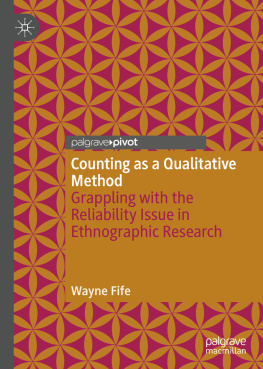RELIABILITY
AND VALIDITY
IN QUALITATIVE
RESEARCH
JEROME KIRK
University of California, Irvine
MARC L. MILLER
University of Washington
Qualitative Research Methods,
Volume 1
Copyright 1986 by Sage Publications, Inc.
All rights reserved. No part of this book may be reproduced or utilized in any form or by any means, electronic or mechanical, including photocopying, recording, or by any information storage and retrieval system, without permission in writing from the publisher.
For information address:
| SAGE Publications, Inc.
2455 Teller Road
Newbury Park, California 91320
E-mail: |
SAGE Publications Ltd
1 Olivers Yard
55 City Road
London EC1Y 1SP |
SAGE Publications India Pvt Ltd
B-42, Panchsheel Enclave
Post Box 4109
New Delhi 110 017 |
Printed in the United States of America
International Standard Book Number | 0-8039-2560-3
0-8039-2470-4 (pbk.) |
Library of Congress Catalog Card No. 85-2412
05 06 07 08 23 22 21 20
CONTENTS
SERIES INTRODUCTION
Contrast and irony provide the definitional context for this series of monographs on qualitative methods. Contrast is inevitable because the label itself makes sense only when set against something it is not. Irony is also inevitable because the denotative contrast between the qualitative and quantitative is so often misleading, if not downright false. The mandate for the series is then paradoxical. We wish to highlight the distinctions between methods thought to be qualitative and quantitative, but also to demonstrate that such distinctions typically break down when subject to scrutiny. Alongside the Sage Series on Quantitative Applications in the Social Sciences comes the Sage Series on Qualitative Research Methods, but the wise reader had best intermingle the monographs of the two sets rather than stack them on separate shelves.
One way of approaching the paradox is to think of qualitative methods as procedures for counting to one. Deciding what is to count as a unit of analysis is fundamentally an interpretive issue requiring judgment and choice. It is, however, a choice that cuts to the core of qualitative methodswhere meanings rather than frequencies assume paramount significance. Qualitative work is blatantly interpretive; but, as the work in this series demonstrates, there are a number of increasingly sophisticated procedures to guide the interpretive acts of social researchers.
The monographs in this series go beyond the short confessionals usually found in the methodology sections of research reports. They also go beyond the rather flat, programmatic treatments afforded qualitative methods in most research textbooks. Not only are qualitative methods becoming more variegated, going well beyond the traditional look, listen, and learn dicta issued by traditional field researchers, they are also being shaped more distinctly by explicit philosophical and moral positions. This series seeks to elaborate both qualitative techniques and the intellectual grounds on which they stand.
The series is designed for the novice eager to learn about specific modes of social inquiry as well as for the veteran researcher curious about the widening range of social science methods. Each contribution extends the boundaries of methodological discourse, but not at the expense of losing the uninitiated. The aim is to minimize jargon, make analytic premises visible, provide concrete examples, and limit the scope of each volume with precision and restraint. These are, to be sure, introductory monographs, but each allows for the development of a lively research theme with subtlety, detail, and illustration. To a large extent, each monograph deals with the specific ways qualitative researchers establish norms and justify their craft. We think the time is right to display the rather remarkable growth of qualitative methods in both number and reflective consideration. We are confident that readers of this series will agree.
John Van Maanen
Peter K. Manning
Marc L. Miller
EDITORS INTRODUCTION
The most venerable tradition among qualitative methods is unquestionably participant observation. Strictly speaking, this stiff but precise phrase refers more to the oscillating situation of researchers as they move in, through, and out of the field than it does to a particular research technique. Jerome Kirk and Marc Miller, in this first volume of the Sage Series on Qualitative Research Methods, classify fieldwork situations in terms of a highly general process model of participant-observation research. They do so well within the conventional wisdom of what constitutes science and, as their title suggests, concern themselves largely with issues surrounding the scientific status of field data. A sort of flowchart of social research, from discovery to analysis, emerges in this monograph along with a guide to the critical issues and themes that characteristically mark each designated phase of the process. A nondoctrinaire but distinctly pragmatic research philosophy accompanies their efforts to bring rhyme and reason to the often chaotic circumstances surrounding participant observation.
RELIABILITY AND VALIDITY IN QUALITATIVE RESEARCH
JEROME KIRK
University of California, Irvine
MARC L. MILLER
University of Washington
AUTHORS NOTE: We relish this opportunity to apologize to all those we fear to acknowledge.
1. OBJECTIVITY IN QUALITATIVE RESEARCH
Qualitative research is a particular tradition in social science that fundamentally depends on watching people in their own territory and interacting with them in their own language, on their own terms. As identified with sociology, cultural anthropology, and political science, among other disciplines, qualitative research has been seen to be naturalistic, ethnographic, and participatory.
It should be remarked at the outset that the term qualitative in reference to this tradition has led to a variety of misunderstandings. Technically, a qualitative observation identifies the presence or absence of something, in contrast to quantitative observation, which involves measuring the degree to which some feature is present. To identify something, the observer must know what qualifies as that thing, or that kind of thing. This entails counting to one. It follows from this narrow consideration that qualitative research would denote any research based on percentages, means, chi-squares, and other statistics appropriate to cardinal, or counting, numbers.
On the other hand, quality connotes the nature, as opposed to the quantity, or amount, of a thing. According to this equally limited consideration, qualitative research would denote any research distinguished by the absence of counting.
These two plausible definitions directly contradict one another. Neither suits the present purpose very well. Whether or not a number gets used in the process of recording and analyzing observations is an entirely abstract issue. By our pragmatic view, qualitative research does imply a commitment to field activities. It does not imply a commitment to innumeracy. Qualitative research is an empirical, socially located phenomenon, defined by its own history, not simply a residual grab-bag comprising all things that are not quantitative. Its diverse expressions include analytic induction, content analysis, semiotics, hermeneutics, elite interviewing, the study of life histories, and certain archival, computer, and statistical manipulations. One purpose of the series of which this volume is a part is to elaborate on these and other possibilities.









